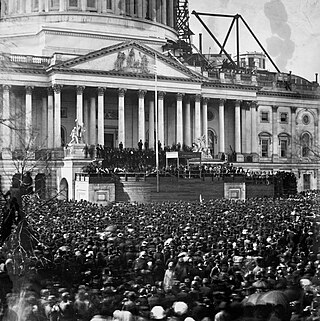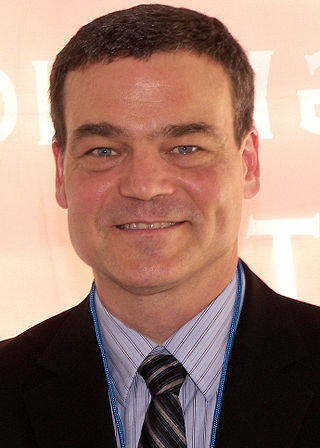
The Gettysburg Address is a speech that U.S. President Abraham Lincoln delivered during the American Civil War at the dedication of the Soldiers' National Cemetery, now known as Gettysburg National Cemetery, in Gettysburg, Pennsylvania on the afternoon of November 19, 1863, four and a half months after the Union armies defeated Confederate forces in the Battle of Gettysburg, the Civil War's deadliest battle. The speech is widely considered one of the most notable and famous delivered in American history.

The Pulitzer Prize for General Nonfiction is one of the seven American Pulitzer Prizes that are awarded annually for the "Letters, Drama, and Music" category. The award is given to a nonfiction book written by an American author and published during the preceding calendar year that is ineligible for any other Pulitzer Prize. The Prize has been awarded since 1962; beginning in 1980, one to three finalists have been announced alongside the winner.

Gettysburg National Cemetery is a United States national cemetery in Gettysburg, Pennsylvania, created for Union casualties from the Battle of Gettysburg in the American Civil War. The Battle of Gettysburg, which was fought between July 1 to 3, 1863, resulted in the largest number of casualties of any Civil War battle but also was considered the war's turning point, leading ultimately to the Union victory.

Andrew Gregg Curtin was an American lawyer and politician. He served as the 15th governor of Pennsylvania during the American Civil War, helped defend his state during the Gettysburg Campaign, and oversaw the creation of the National Cemetery and the ceremony in which Abraham Lincoln delivered his famous Gettysburg Address.

Garry Wills is an American author, journalist, political philosopher, and historian, specializing in American history, politics, and religion, especially the history of the Catholic Church. He won a Pulitzer Prize for General Nonfiction in 1993.

Alex Ross is an American music critic and author who specializes in classical music. Ross has been a staff member of The New Yorker magazine since 1996. His extensive writings include performance and record reviews, industry updates, cultural commentary, and historical narratives in the realm of classical music. He has written three well-received books: The Rest Is Noise: Listening to the Twentieth Century (2007), Listen to This (2011), and Wagnerism: Art and Politics in the Shadow of Music (2020).
Oscar Benjamin Cintas y Rodriguez, was a prominent sugar and railroad magnate who served as Cuba's ambassador to the United States from 1932 until 1934.

"Pericles's Funeral Oration" is a famous speech from Thucydides's History of the Peloponnesian War. The speech was supposed to have been delivered by Pericles, an eminent Athenian politician, at the end of the first year of the Peloponnesian War as a part of the annual public funeral for the war dead.
The 1993 Pulitzer Prizes were:

David Brion Davis was an American intellectual and cultural historian, and a leading authority on slavery and abolition in the Western world. He was a Sterling Professor of History at Yale University, and founder and director of Yale's Gilder Lehrman Center for the Study of Slavery, Resistance, and Abolition.

Don Edward Fehrenbacher was an American historian. He wrote on politics, slavery, and Abraham Lincoln. He won the 1979 Pulitzer Prize for History for The Dred Scott Case: Its Significance in American Law and Politics, his book about the Dred Scott Decision. In 1977 David M. Potter's The Impending Crisis, 1848-1861, which he edited and completed, won the Pulitzer Prize. In 1997 he won the Lincoln Prize.

Gabor S. Boritt is an American historian. He was the Robert Fluhrer Professor of Civil War Studies and Director of the Civil War Institute at Gettysburg College. Born and raised in Hungary, he participated as a teenager in the Hungarian Revolution of 1956 against the Soviet Union before escaping to America, where he received his higher education and became a scholar of Abraham Lincoln and the American Civil War. He is the author, co-author, or editor of 16 books about Lincoln or the War. Boritt received the National Humanities Medal in 2008 from President George W. Bush.

David Wills was the principal figure in the establishment of the National Cemetery at Gettysburg, Pennsylvania. As a result of his efforts, the Gettysburg Address was given by Abraham Lincoln. Wills was Lincoln's host while in Gettysburg, and the Gettysburg Address was completed in the large upstairs bedroom occupied by the President during his brief stay in the town.

Abraham Lincoln's first inaugural address was delivered on Monday, March 4, 1861, as part of his taking of the oath of office for his first term as the sixteenth president of the United States. The speech, delivered at the United States Capitol, was primarily addressed to the people of the South and was intended to succinctly state Lincoln's intended policies and desires toward that section, where seven states had seceded from the Union and formed the Confederate States of America.

Hanover Junction is a small unincorporated community, which is located in south-central York County, Pennsylvania, United States, near the borough of Seven Valleys. The junction serves as a rest stop on the York County Heritage Rail Trail.

T. J. Stiles is an American biographer who lives in Berkeley, California. His book The First Tycoon: The Epic Life of Cornelius Vanderbilt won a National Book Award and the 2010 Pulitzer Prize for Biography or Autobiography. His book Custer's Trials: A Life on the Frontier of a New America received the 2016 Pulitzer Prize for History.

The Soldiers' National Monument is a Gettysburg Battlefield memorial which is located at the central point of Gettysburg National Cemetery. It honors the battle's soldiers and tells an allegory of "peace and plenty under freedom … following a heroic struggle." In addition to an inscription with the last 4 lines of the Gettysburg Address, the shaft with 4 buttresses has 5 statues:
A large statue representing the concept of Liberty surmounts the pedestal. Eighteen large bronze stars circling the pedestal below this statue represent the eighteen Union states with buried dead. A statue is located at each corner near the base. They represent War, History, Peace, and Plenty. War is represented by a statue of an American soldier who recounts the story of the battle to History. In turn, History records, with stylus and tablet, the achievements of the battle and the names of the honored dead. A statue of an American mechanic and his tools illustrates Peace. Plenty is a female figure with a sheaf of wheat and the fruits of the earth that typify peace and abundance as the soldier's crowning triumph.

The Consecration of the Soldiers' National Cemetery was the ceremony at which U.S. President Abraham Lincoln delivered the Gettysburg Address on November 19, 1863. In addition to the 15,000 spectators, attendees included six state governors: Andrew Gregg Curtin of Pennsylvania, Augustus Bradford of Maryland, Oliver P. Morton of Indiana, Horatio Seymour of New York, Joel Parker of New Jersey, and David Tod of Ohio. Reporters present included Joseph Gilbert, Charles Hale, John Russell Young ; and Cincinnati Commercial, New York Tribune, & The New York Times reporters.

Joyce Lee Malcolm is the Patrick Henry Professor of Constitutional Law and the Second Amendment at George Mason University School of Law. She has been called "the leading historian on the history of English gun control and gun rights" by David Kopel.
The following outline is provided as an overview of and topical guide to Abraham Lincoln:


















